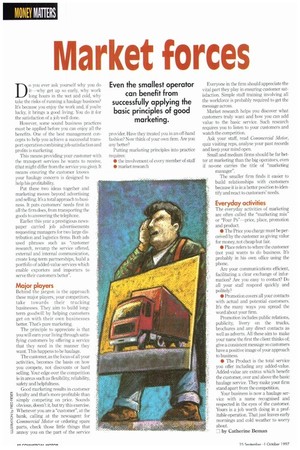Market forces
Page 50

If you've noticed an error in this article please click here to report it so we can fix it.
Even the smallest operator can benefit from successfully applying the basic principles of good marketing.
Do you ever ask yourself why you do it —why get up so early, why work long hours in the wet and cold, why take the risks of running a haulage business? It's because you enjoy the work and, if you're lucky, it brings a good living. You do it for the satisfaction of a job well done.
However, some sound business practices must be applied before you can enjoy all the benefits. One of the best management concepts to help you achieve a successful transport operation combining job satisfaction and profits is marketing.
This means providing your customer with the transport services he wants to receive, (that might differ from the service you give). It means ensuring the customer knows your haulage concern is designed to help his profitability.
Put these two ideas together and marketing moves beyond advertising and selling. It's a total approach to business. It puts customers' needs first in all the firm does, from transporting the goods to answering the telephone.
Earlier this year a prestigious newspaper carried job advertisements requesting managers for two large distribution and logistics firms. Both ads used phrases such as "customer research, revamp the service offered, external and internal communication, create long-term partnerships, build a portfolio of added-value services which enable exporters and importers to serve their customers better".
Major players
Behind the jargon is the approach these major players, your competitors, take towards their trucking businesses. They aim to build longterm goodwill by helping custothers get on with their own businesses better. That's pure marketing.
The principle to appreciate is that you will earn your living through satisfying customers by offering a service that they need in the manner they want. This happens to be haulage.
The customer, as the focus of all your activities, becomes the basis on how you compete, not discounts or hard selling. Your edge over the competition is in areas such as flexibility, reliability, safety and helpfulness.
Good marketing results in customer loyalty and that's more profitable than simply competing on price. Sounds obvious, doesn't it, but try this exercise. Whenever you are a "customer", at the bank, calling at the newsagent for Commercial Motor or ordering spare parts, check those little things that annoy you on the part of the service
provider. Have they treated you in an off-hand fashion? Now think of your own firm. Are you any better?
Putting marketing principles into practice requires: • the involvement of every member of staff • market research Everyone in the firm should appreciate the vital part they play in ensuring customer satisfaction. Simple staff training involving all the workforce is probably required to get the message across.
Market research helps you discover what customers truly want and how you can add value to the basic service. Such research requires you to listen to your customers and watch the competition.
Ask your staff, read Commercial Motor, quiz visiting reps, analyse your past records and keep your mind open.
Small and medium firms should be far better at marketing than the big operators, even if no-one carries the title of "marketing manager".
The smaller firm finds it easier to build relationships with customers because it is in a better position to identify and react to customers' needs.
Everyday activities
The everyday activities of marketing are often called the "marketing mix" or "Four Ps"—price, place, promotion and product.
• The Price you charge must be perceived by the customer as giving value for money, not cheap but fair.
• Place refers to where the customer (not you) wants to do business. It's probably in his own office using the phone.
Are your communications efficient, facilitating a clear exchange of information? Are you easy to contact? Do all your staff respond quickly and politely?
• Promotion covers all your contacts with actual and potential customers. It's the many ways you spread the word about your firm.
Promotion includes public relations, publicity, livery on the trucks, brochures and any direct contacts as well as adverts. All these aim to make your name the first the client thinks of; give a consistent message so customers have a positive image of your approach to business.
• The Product is the total service you offer including any added-value. Added-value are extras which benefit the customer, over and above the basic haulage service. They make your firm stand apart from the competition.
Your business is now a haulage service with a name recognised and respected in the eyes of the customer. Yours is a job worth doing in a profitable operation. That just leaves early mornings and cold weather to worry about.
II by Catherine Beman
















































































































